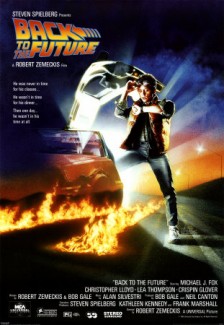Back to the Future (Robert Zemeckis, 1985): USA
Reviewed by Richard Feilden. Viewed on DVD.
Twenty-five years can age a film. Science fiction films are particularly vulnerable, with special effects that seemed to defy reality when they first hit the screen quickly turning comical, but for all the wrong reasons. The only thing more at risk than sci-fi is sci-fi that deals with the future. From bacofoil suits and weird haircuts to flying cars and jetpacks, the future always looks hokey by the time we catch up with the filmmaker’s vision. Thankfully, one film from the 80s defies the odds. Working with writer Bob Gale, Robert Zemeckis produced a timeless classic when he gave us Back to the Future.
Zemeckis avoids the clichéd costumes and future-tech by sending young Marty McFly (Michael J Fox) back in time to 1955 in a nuclear powered DeLorean. Once there, all he has to do is ensure that his parents fall in love, save the life of his friend Doc Brown (Christopher Lloyd) 30 years in the future, and harness the power of a single bolt of lightning to return him to his own time. Piece of cake.
For a film about science, it’s appropriate that one of the things that really makes it work is chemistry. Fox and Lloyd create a straight man/funny man pairing feels unbelievably natural. It’s not a substitute father/son relationship, though poor Marty certainly starts the film in need of one, nor that of a mad scientist and his eager lab assistant. It’s almost like a perfect a marriage – they are similar enough for their friendship to seem obvious, different enough that it’s mutually beneficial. And where Fox brings his boyish charm (that it never becomes cloying is one of the things that makes him special), Lloyd dishes out the bug-eyed insanity. Yet neither steals the show from the other. There’s a scene where the 1950s version of Marty’s mom (Lea Thompson) calls at Doc’s house to seduce her horrified son into taking her to a school dance. While the Electra flirtation plays out, Lloyd stalks the set, pantomiming his way through confusion, shock and reproach. Yet he never pulls attention from the scene. He’s the icing on a deliciously awkward cake.
One of the other aspects that makes this film such a pleasure is that the more you invest, the more it rewards you. At heart, it’s a fairly simple, high concept film. But in its execution it provides layers of visual complexity and jokes, many of which only become apparent if you watch really, really carefully. Take the Twin Pines shopping mall, the location of a scene early in the film. When he goes back in time, we see Marty run over one of a pair of spruce saplings, and returning to the mall at the end of the film, it’s name has changed to ‘Lone Pine’. Then there’s the ‘Rube Goldberg’ machines in Doc’s house, Marty’s compilation of great guitarist’s mannerisms when he performs on stage for you to spot, and all the carefully placed lines that, while apparently throw-away when delivered, become key as the film progresses. It makes such a refreshing change from the ‘beat the audience over the head with it’ approach that many recent comedies have taken.
Having said all that, watching Back to the Future is an experience for me that is always tinged with just a little sadness. It’s not the film’s fault, but I can’t help but wonder what Fox might have gone on to make had he not been afflicted by Parkinson’s disease. To feel regret that we’ve been robbed of years of his performances seems churlish when one considers what the man himself has suffered, but I’d be lying if I said I wasn’t saddened that we’ve been denied his screen presence. The man himself though seems to be a paragon of positive thought, and perhaps that makes this film a fitting testament to him. Back to the Future is not about the power of science (though hopefully Fox’s advocacy for research into a cure for Parkinson’s will pay dividends) or even, as Huey Lewis sings on the soundtrack, the power of love. It’s about what you can do with a positive attitude. Perhaps that is what makes Back to the Future ageless. Even without a time machine, I’m willing to bet we’ll still be watching it in another twenty five years.

47 Comments
Jump to comment form | comments rss [?] | trackback uri [?]